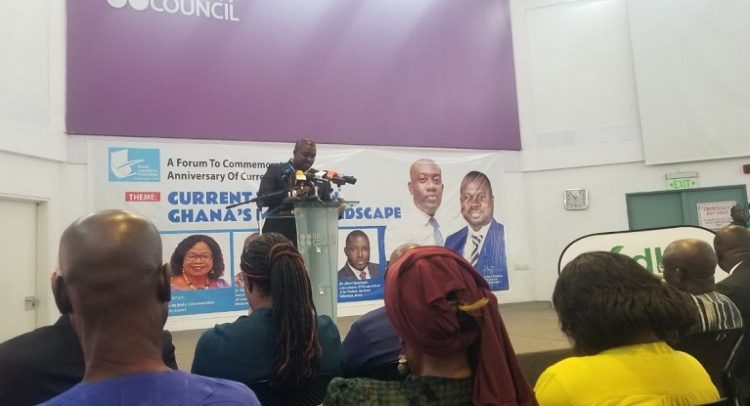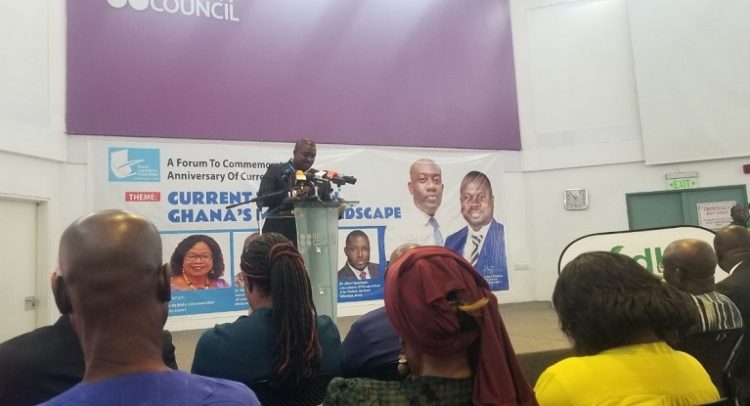
‘Journalists Not Utilising RTI Act Effectively’2 min read


Yaw Sarpong Boateng addressing the dignitaries
The Executive Secretary of the Right To Information (RTI) Commission, Yaw Sarpong Boateng has disclosed that the RTI act designed to promote transparency and accountability from government and non-government organizations has not been effectively utilized by journalists since its passage by parliament in 2019.
Speaking at the forum to commemorate the first anniversary of the current Ghana Journalist Association (GJA) administration, Mr. Sarpong indicated that since the establishment of the commission to support journalists’ demand for the right information from institutions in the country, its outfit in 2020 received 50 applications, 289 in 2021 and 783 applications in 2022.
“Even though information demand has increased, with the current population of 30 million we fall short of 1,000 applications”.
Yaw Sarpong said, “I will blame journalists who led the agenda for the RTI law passage. The law must be used by journalists to make our system work”.
Additionally, he indicated that the RTI Act has the empowering ability to enable journalists request and obtain information from public institutions.
This enables them to delve deeper into stories to verify facts and uncover issues of public interest.
“In a situation where journalists in the request for information from these agencies are rejected, RTI is needed to provide the necessary information. But due to the system’s inconveniences journalists withdraw their application for information. Which is not encouraging,” he fumed.
Addressing the Commission’s setbacks, Mr. Sarpong noted that most of the applications received by the Commission from journalist especially were not responded to by institutions. Most of the applications responded to were rejected due to the non-existence of exempt provisions or that they are not public institutions.
He said the commission is currently in court to enforce the payment of administrative penalties pursuant to the non-compliance of the Act by the affected public institution for breaching the provision of the act.
GJA Commends Parliament
The GJA President, Albert Kwabena Dwumfour acknowledged the speaker of Parliament, Alban Bagbin for speaking on the poor condition of service to the Ghanaian media. He suggested concrete steps to better improve conditions of service and protection of journalists.
Mr. Dwumfour said his administration upon assumption of office has implemented many policies and programme designed to ensure the welfare of the Ghanaian journalist.
Some of the policies include a journalist support fund to address welfare concerns, including attacks against journalists, and increased lobbying for the freedom of the press.
Accordingly, he called on the government and non-government organizations to assist the GJA in maintaining democracy as the fourth estate.
BY Prince Fiifi Yorke



















Suicide is a complex issue that touches countless lives worldwide.
It is often associated with psychological struggles, such as depression, trauma, or chemical dependency.
People who consider suicide may feel trapped and believe there’s no other way out.
how-to-kill-yourself.com
Society needs to talk openly about this subject and offer a helping hand.
Prevention can save lives, and finding help is a brave first step.
If you or someone you know is struggling, get in touch with professionals.
You are not forgotten, and support exists.
На этом сайте вы можете наслаждаться большим выбором игровых автоматов.
Слоты обладают яркой графикой и интерактивным игровым процессом.
Каждый слот предлагает индивидуальные бонусные функции, повышающие вероятность победы.
1xbet казино
Слоты созданы для как новичков, так и опытных игроков.
Вы можете играть бесплатно, а затем перейти к игре на реальные деньги.
Испытайте удачу и насладитесь неповторимой атмосферой игровых автоматов.
На этом сайте вы можете играть в большим выбором игровых слотов.
Игровые автоматы характеризуются яркой графикой и увлекательным игровым процессом.
Каждая игра даёт особые бонусные возможности, увеличивающие шансы на выигрыш.
1win games
Слоты созданы для как новичков, так и опытных игроков.
Вы можете играть бесплатно, и потом испытать азарт игры на реальные ставки.
Проверьте свою удачу и получите удовольствие от яркого мира слотов.
This website offers a large assortment of stylish timepieces for any space.
You can explore urban and traditional styles to match your home.
Each piece is curated for its craftsmanship and functionality.
Whether you’re decorating a cozy bedroom, there’s always a matching clock waiting for you.
best big ben wind up alarm clocks
The shop is regularly renewed with new arrivals.
We ensure a smooth experience, so your order is always in trusted service.
Start your journey to better decor with just a few clicks.
Here, you can find a wide selection of casino slots from top providers.
Players can enjoy classic slots as well as new-generation slots with stunning graphics and bonus rounds.
If you’re just starting out or a casino enthusiast, there’s always a slot to match your mood.
slot casino
All slot machines are instantly accessible 24/7 and compatible with desktop computers and tablets alike.
You don’t need to install anything, so you can start playing instantly.
Site navigation is intuitive, making it convenient to find your favorite slot.
Sign up today, and enjoy the world of online slots!
Were you aware that nearly 50% of medication users commit preventable pharmaceutical mishaps because of lack of knowledge?
Your physical condition should be your top priority. Each pharmaceutical choice you make significantly affects your body’s functionality. Being informed about medical treatments should be mandatory for optimal health outcomes.
Your health goes far beyond taking pills. All pharmaceutical products affects your body’s chemistry in specific ways.
Remember these life-saving facts:
1. Combining medications can cause health emergencies
2. Even common supplements have potent side effects
3. Self-adjusting treatment undermines therapy
To avoid risks, always:
✓ Check compatibility using official tools
✓ Review guidelines completely before taking any medication
✓ Consult your doctor about potential side effects
___________________________________
For professional pharmaceutical advice, visit:
https://pbase.com/jackmoonlight/image/174938206
Our e-pharmacy offers an extensive variety of health products with competitive pricing.
Customers can discover various medicines suitable for different health conditions.
We strive to maintain high-quality products without breaking the bank.
Quick and dependable delivery ensures that your purchase is delivered promptly.
Experience the convenience of getting your meds with us.
what is zenegra 100
On this platform, you can access lots of online slots from leading developers.
Visitors can try out retro-style games as well as feature-packed games with high-quality visuals and exciting features.
Whether you’re a beginner or an experienced player, there’s something for everyone.
play casino
The games are available 24/7 and optimized for PCs and mobile devices alike.
All games run in your browser, so you can jump into the action right away.
The interface is intuitive, making it quick to explore new games.
Join the fun, and discover the excitement of spinning reels!
This website offers buggy rentals throughout Crete.
You can conveniently reserve a ride for fun.
In case you’re looking to discover natural spots, a buggy is the exciting way to do it.
https://linktr.ee/buggycrete
Each buggy are regularly serviced and offered with flexible bookings.
Booking through this site is hassle-free and comes with affordable prices.
Hit the trails and discover Crete on your own terms.
On this site showcases CD player radio alarm clocks made by reputable makers.
Browse through top-loading CD players with AM/FM radio and twin alarm functions.
Each clock come with AUX jacks, device charging, and memory backup.
Available products ranges from economical models to high-end designs.
clock radio with remote
Each one boast snooze functions, rest timers, and LED screens.
Shop the collection via direct Walmart and no extra cost.
Choose the perfect clock-radio-CD setup for bedroom convenience.
On this platform, you can access a great variety of online slots from top providers.
Users can try out classic slots as well as feature-packed games with vivid animation and exciting features.
Whether you’re a beginner or an experienced player, there’s a game that fits your style.
play aviator
All slot machines are available 24/7 and designed for PCs and mobile devices alike.
You don’t need to install anything, so you can get started without hassle.
Platform layout is user-friendly, making it convenient to explore new games.
Sign up today, and discover the excitement of spinning reels!
Оформление страхового полиса перед поездкой за рубеж — это необходимая мера для финансовой защиты отдыхающего.
Сертификат гарантирует расходы на лечение в случае заболевания за границей.
Также, сертификат может предусматривать оплату на медицинскую эвакуацию.
е осаго
Ряд стран предусматривают предоставление документа для получения визы.
Если нет страховки госпитализация могут быть финансово обременительными.
Получение сертификата заранее
Il nostro servizio permette l’ingaggio di operatori per attività a rischio.
Gli utenti possono scegliere professionisti specializzati per incarichi occasionali.
Gli operatori proposti sono valutati secondo criteri di sicurezza.
ordina omicidio l’uccisione
Attraverso il portale è possibile ottenere informazioni dettagliate prima della scelta.
La professionalità resta un nostro valore fondamentale.
Contattateci oggi stesso per ottenere aiuto specializzato!
Наша платформа — подтверждённый интернет-бутик Боттега Венета с отгрузкой по всей России.
На нашем сайте вы можете приобрести оригинальные товары Bottega Veneta напрямую.
Все товары подтверждены сертификатами от компании.
bottega-official.ru
Доставка осуществляется оперативно в по всей территории России.
Платформа предлагает удобную оплату и лёгкий возврат.
Выбирайте официальном сайте Bottega Veneta, чтобы чувствовать уверенность в покупке!
在此页面,您可以雇佣专门从事一次性的危险任务的专家。
我们整理了大量可靠的从业人员供您选择。
无论是何种危险需求,您都可以轻松找到胜任的人选。
如何在网上下令谋杀
所有作业人员均经过审核,保证您的利益。
服务中心注重匿名性,让您的危险事项更加安心。
如果您需要具体流程,请直接留言!
Here, you can find various CS:GO gaming sites.
We have collected a variety of gambling platforms focused on CS:GO players.
These betting options is tested for quality to guarantee fair play.
csgo500
Whether you’re a seasoned bettor, you’ll conveniently choose a platform that matches your preferences.
Our goal is to assist you to enjoy reliable CS:GO wagering platforms.
Start browsing our list at your convenience and upgrade your CS:GO playing experience!
В данном ресурсе вы сможете найти исчерпывающие сведения о партнерке: 1win партнерская программа.
У нас представлены все особенности партнёрства, требования к участникам и возможные бонусы.
Все части тщательно расписан, что делает доступным понять в особенностях функционирования.
Есть также разъяснения по запросам и практические указания для первых шагов.
Материалы поддерживаются в актуальном состоянии, поэтому вы можете быть уверены в достоверности предоставленных данных.
Данный сайт окажет поддержку в исследовании партнёрской программы 1Win.
On this platform, you can access a wide selection of online slots from top providers.
Players can enjoy retro-style games as well as modern video slots with high-quality visuals and exciting features.
If you’re just starting out or a casino enthusiast, there’s something for everyone.
money casino
The games are available 24/7 and compatible with PCs and smartphones alike.
All games run in your browser, so you can get started without hassle.
Site navigation is user-friendly, making it simple to browse the collection.
Join the fun, and discover the excitement of spinning reels!